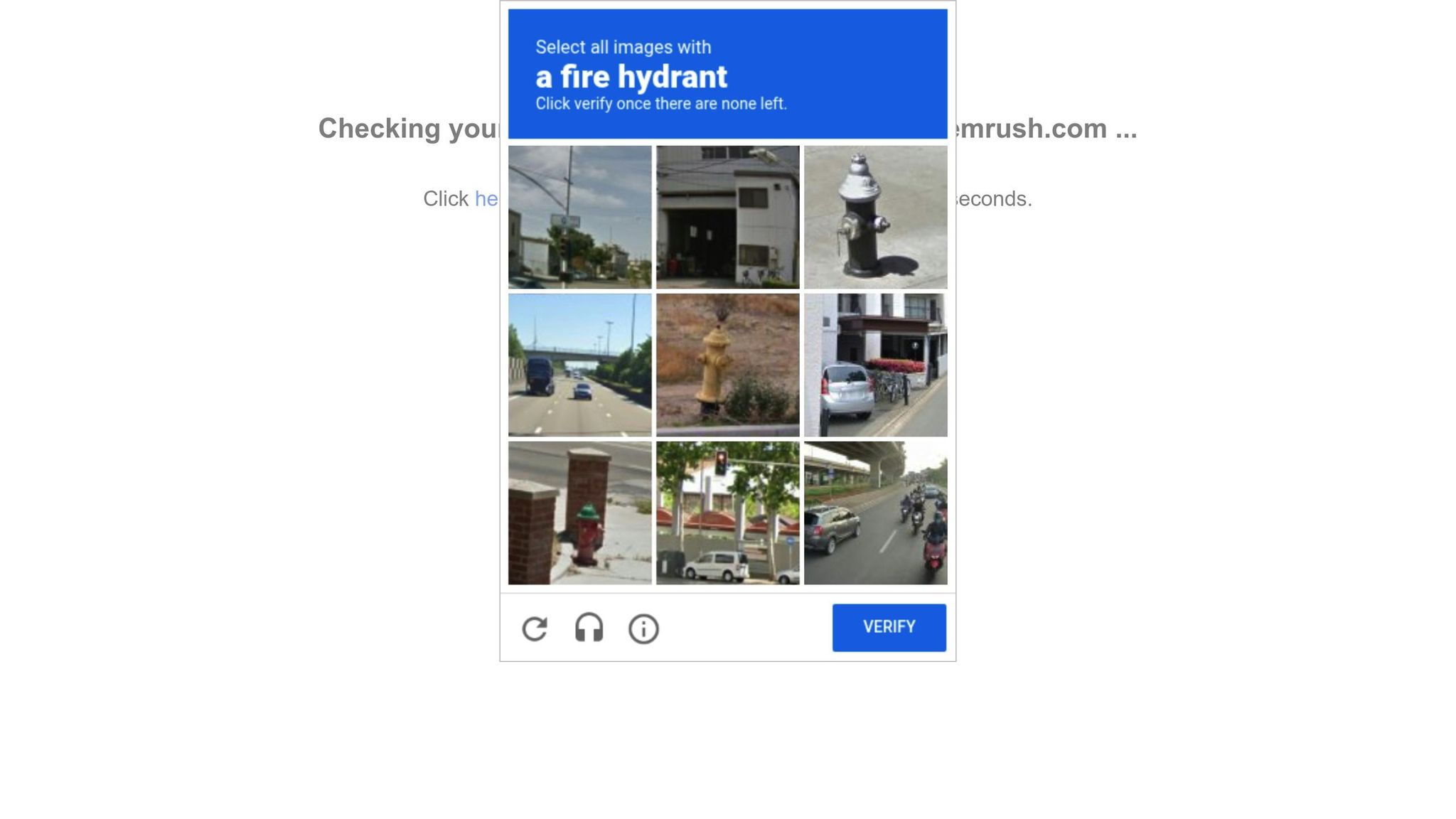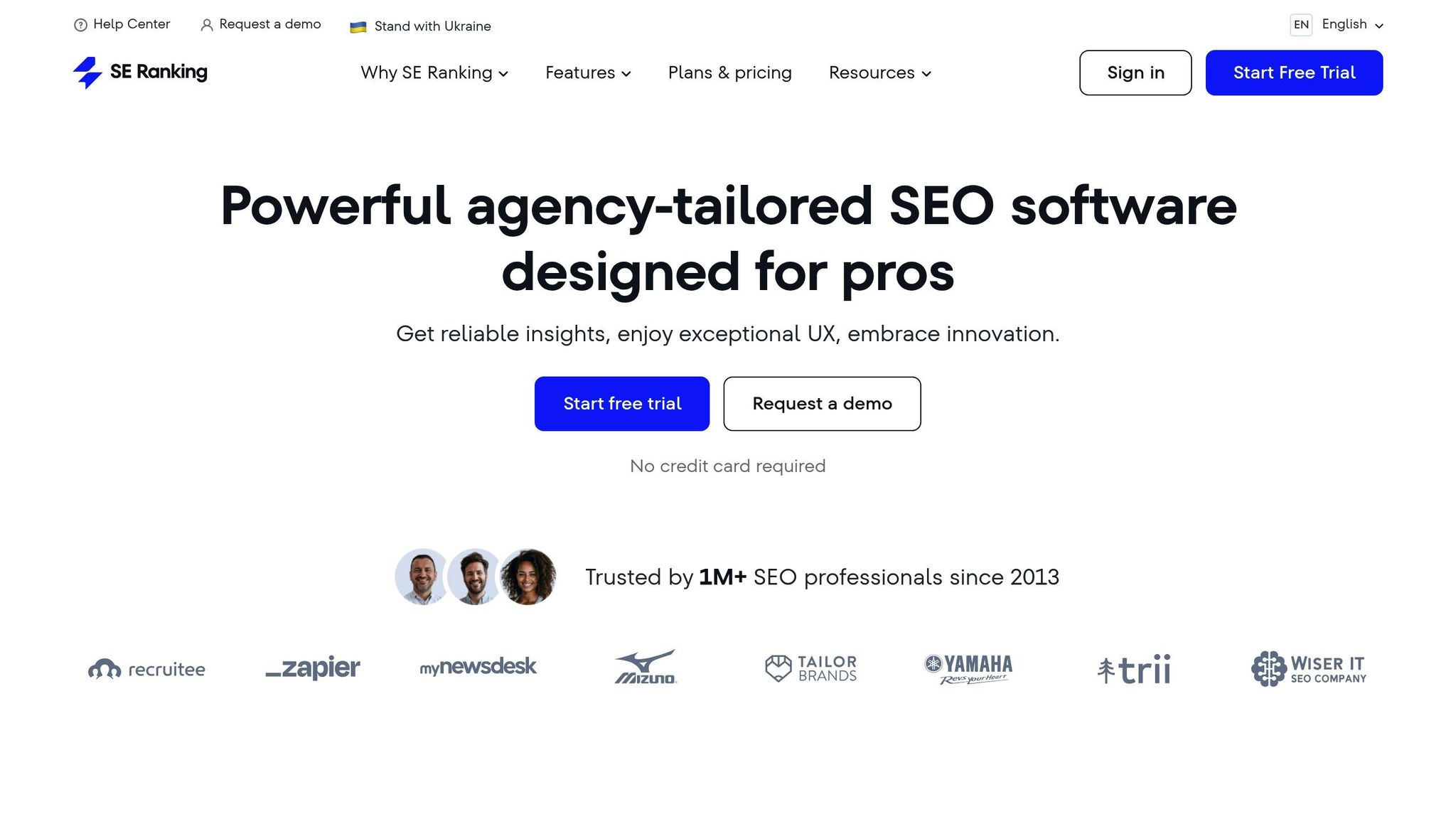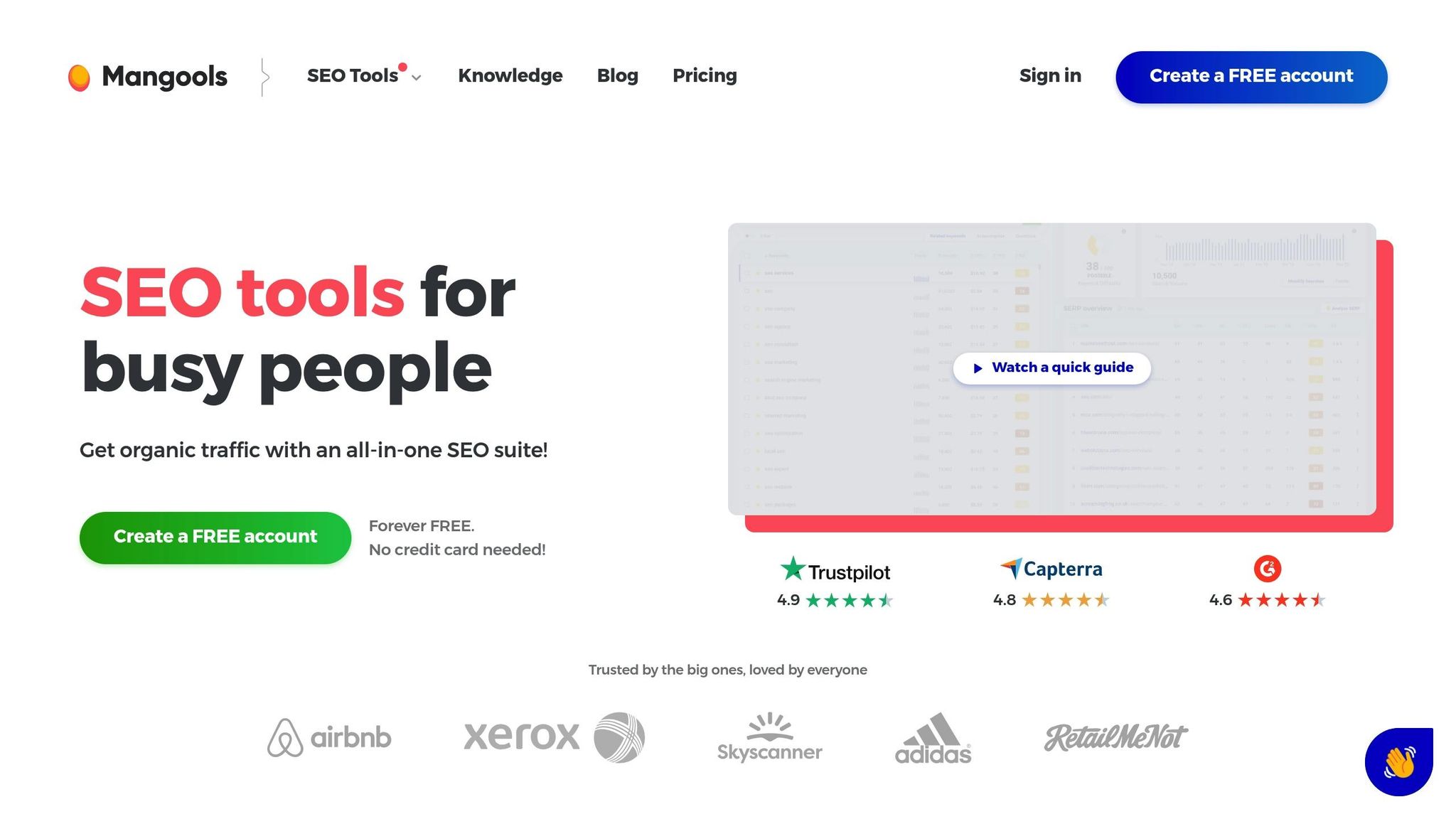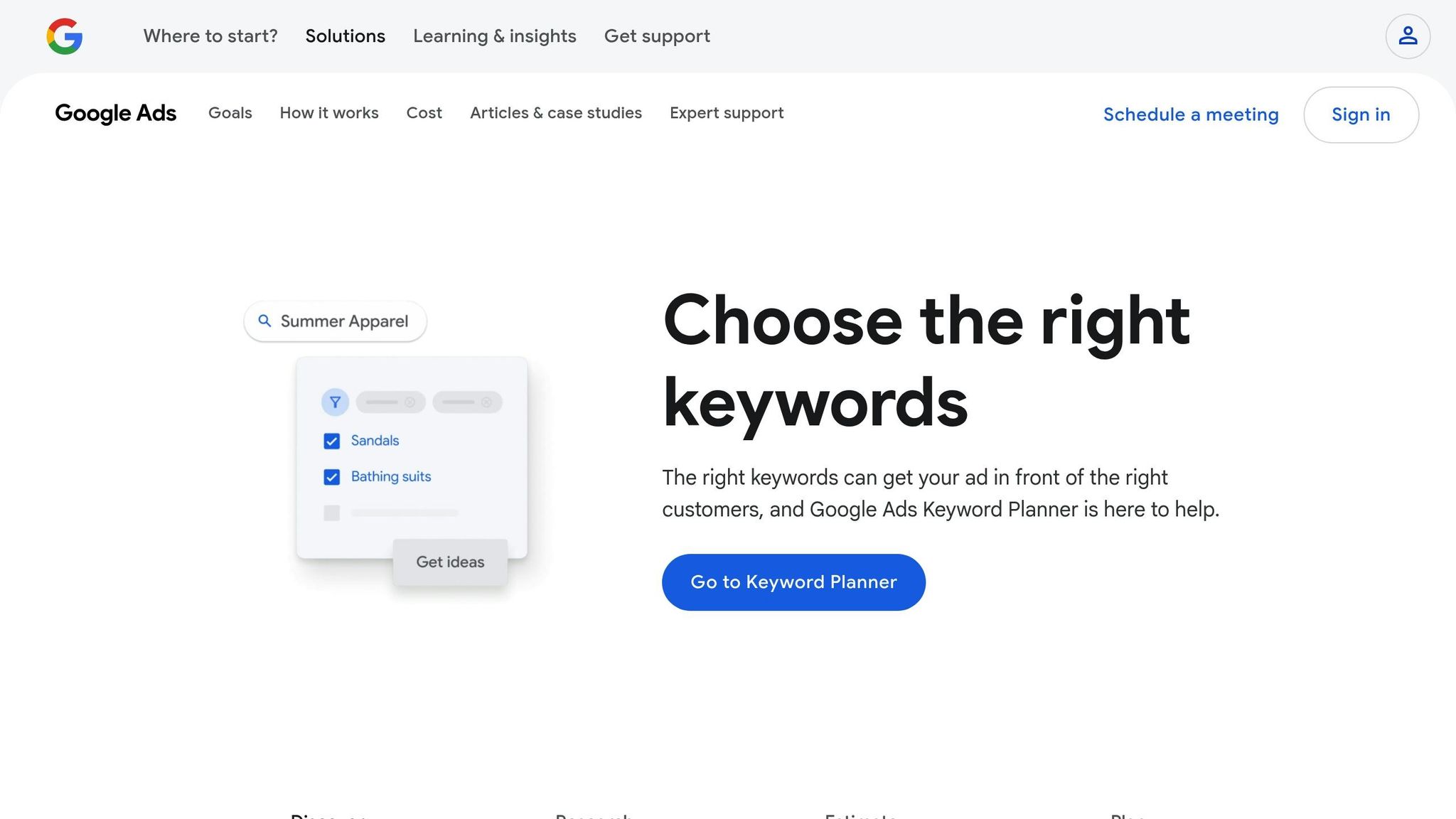Tracking keywords is essential for improving your real estate website’s visibility. Whether you’re targeting local markets or analyzing competitors, choosing the right tool can make a big difference. Here’s a quick summary of the top tools:
- Semrush: Advanced local tracking, SERP monitoring, and detailed competitor analysis. Ideal for large agencies.
- Ahrefs: Excellent for location-based tracking and historical data. Great for mid-size brokerages.
- SE Ranking: Affordable and offers basic multi-location tracking. Best for small agencies.
- Mangools (SERPWatcher): Simple and affordable with strong local keyword tracking. Suited for individual agents.
- Google Keyword Planner: Free but limited to basic keyword research. Perfect for beginners or tight budgets.
Quick Comparison Table
| Tool | Starting Price | Local SEO Features | Update Frequency | Competitor Tracking | Reporting Options |
|---|---|---|---|---|---|
| Semrush | Premium | Advanced local tracking | Daily | Strong | Comprehensive |
| Ahrefs | Premium | City-level rank tracking | Daily | Robust | Advanced |
| SE Ranking | Affordable | Multi-location tracking | Daily | Effective | Basic |
| Mangools | Affordable | Basic location filtering | Daily | Basic | Simple |
| Google Keyword Planner | Free | Basic city and region filtering | Monthly | Basic | Limited |
Each tool has its strengths depending on your needs, budget, and business size. Read on to learn more about their features and how they can help you improve your real estate SEO strategy.
Keyword Performance Analysis: How to Track & Report On …
Exploring Semrush: Features and Benefits for Real Estate SEOSemrush

Semrush is a keyword tracking tool tailored to meet the needs of real estate professionals. Its Position Tracking tool helps monitor rankings at a local level, which is crucial for location-based strategies.
Key Features for Real Estate SEO:
- Local Search Tracking: Keep an eye on keyword rankings across different neighborhoods and cities.
- Device-Specific Insights: Track rankings separately for mobile and desktop users.
- SERP Feature Monitoring: Check your visibility in local packs, featured snippets, and property-specific search results.
- Competitor Comparison: Analyze how your rankings stack up against local competitors.
Rankings are updated daily, and historical data is available to help spot trends quickly.
Pricing Details:
Semrush offers tiered plans with features like daily updates, device-specific tracking, and custom reporting. Smaller agencies can opt for basic plans, while larger firms may benefit from advanced options, including API access.
Reporting and Data Accuracy
The platform provides detailed metrics tailored to real estate SEO. Automated PDF reports summarize changes in rankings, visibility, and key SERP features, making it easier to track performance.
Integration Options
Semrush connects seamlessly with Google Analytics and Google Search Console. This allows real estate professionals to link ranking changes to website traffic and lead generation metrics, offering a full picture of how keyword performance drives business results. Up next, we’ll look at how another tool compares.
2. Ahrefs

Ahrefs offers powerful keyword tracking tools tailored for real estate professionals. Its Rank Tracker provides detailed insights into keyword performance across various locations, making it easier to manage property listings in different areas.
Key Features for Real Estate
- Location-Based Tracking: Keep an eye on rankings in specific zip codes and neighborhoods.
- Mobile vs. Desktop Performance: Compare how listings perform across devices.
- SERP Feature Monitoring: Track visibility in local packs and property carousels.
- Historical Data Analysis: Analyze ranking trends and changes over time.
Rank Tracking Capabilities
Ahrefs updates keyword rankings every 3–7 days, making it effective for monitoring local search intent. This is especially useful for targeting specific real estate markets. Users can track up to 10,000 keywords at once, which is ideal for larger agencies managing multiple properties.
Data Visualization
The platform uses easy-to-read graphs and charts to display ranking changes, seasonal trends, competitor performance, and overall visibility. This makes it simple to identify patterns and adjust strategies accordingly.
Reporting Tools
Ahrefs allows users to create customizable reports that highlight ranking progress for different property types and locations. Reports can be scheduled and sent automatically to team members or clients, saving time and keeping everyone updated.
Integration Options
Ahrefs integrates with Google Analytics and Google Search Console, enabling users to link ranking data with:
- Performance metrics for property listing pages
- Lead generation data
- User engagement statistics
- Conversion tracking for property inquiries
These integrations ensure consistent tracking of property performance and client engagement, helping to fine-tune strategies for local market success.
Pricing
The cost depends on how often you need updates and the number of keywords you want to track. Plans range from basic monthly updates to more frequent tracking for competitive markets.
Ahrefs stands out for its precise local tracking, making it an excellent choice for agencies managing listings across multiple markets. Its ability to monitor performance across different locations ensures consistent visibility in the competitive real estate landscape.
3. SE Ranking

SE Ranking provides straightforward keyword tracking but doesn’t include specialized tools tailored for in-depth local real estate analysis. It’s best to reach out to the provider to confirm if its tracking features align with your regional market requirements. Up next, we’ll take a closer look at Mangools (SERPWatcher) and its performance in real estate SEO tracking.
sbb-itb-880d5b6
4. Mangools (SERPWatcher)

SERPWatcher, part of the Mangools suite, focuses on pinpointing keyword performance in specific locations. Its user-friendly interface is tailored for tracking local search rankings, letting users monitor keywords with precise geographic targeting – even down to zip codes. This level of detail helps uncover trends and opportunities in local markets.
One standout feature is Daily Rank Tracking, which updates keyword rankings every 24 hours. This ensures professionals always have current data, especially in fast-changing industries.
Thanks to these capabilities, SERPWatcher is a great fit for tracking localized keywords, particularly in the U.S. real estate sector. It complements the other tools we’ve discussed by offering a more location-focused approach.
5. Google Keyword Planner

Google Keyword Planner is a go-to option for real estate professionals who want basic keyword tracking without spending extra money. Although it’s primarily built for Google Ads users, it offers helpful insights for improving organic SEO in real estate.
Key Features for Real Estate SEO
This tool provides monthly search volume ranges and competition levels for property-related keywords. For example, you can explore broad terms like "homes for sale" or focus on specific phrases like "Manhattan luxury apartments" or "San Francisco real estate market."
Location-Specific Insights: You can filter data by geographic area, from state-level down to specific cities. This makes it especially useful for agents or brokers targeting local markets.
Limitations to Keep in Mind
- Search volumes are displayed as ranges, not exact numbers.
- Data updates are less frequent compared to paid tools.
- Lacks advanced rank tracking features.
- Requires an active Google Ads account for access.
When to Use It
Google Keyword Planner is ideal for starting your keyword research and validating local real estate terms. Pairing it with Google Trends can help you spot seasonal trends in property searches across U.S. markets.
For real estate professionals on a tight budget, this tool is a practical choice. However, combining it with other SEO tools can provide deeper tracking and competitive insights.
Check out our comparison chart to see how Google Keyword Planner measures up against other platforms.
Tool Comparison Chart
Here’s a detailed comparison of keyword tracking tools tailored for real estate SEO:
| Feature | Semrush | Ahrefs | SE Ranking | Mangools | Google Keyword Planner |
|---|---|---|---|---|---|
| Starting Price | Premium | Premium | Affordable | Affordable | Free (with a Google Ads account) |
| Local SEO Features | Advanced local tracking with neighborhood monitoring | City-level rank tracking | Multi-location tracking | Basic location filtering | Basic city and region filtering |
| Real Estate Keywords | Extensive database of property-related keywords | Wide range of industry keywords | Broad selection of listing keywords | Essential real estate keyword options | Limited real estate data |
| Update Frequency | Daily | Daily | Daily | Daily | Monthly |
| Mobile Rankings | Yes | Yes | Yes | Yes | Basic |
| Historical Data | Trend data spanning several years | Extensive historical data | Moderate historical data | Basic historical data | Approximately one year of data |
| Competitor Tracking | Strong competitor insights | Robust tracking | Effective tracking | Basic tracking | Basic competitive insights |
| Custom Reports | Comprehensive custom reports | Advanced reporting options | Basic custom reports | Simple reporting features | Limited reporting capabilities |
Below, we dive deeper into specific features and their relevance for real estate professionals.
Cost-Effectiveness Analysis
If you’re balancing budget and functionality, here’s a breakdown of ROI for each tool:
| Tool | Best For | ROI Potential |
|---|---|---|
| Semrush | Large agencies | High – combines extensive features into one platform |
| Ahrefs | Mid-size brokerages | High – excels in backlink analysis and insights |
| SE Ranking | Small agencies | High – affordable with solid tools |
| Mangools | Individual agents | Moderate – covers key basics at a low price |
| Google Keyword Planner | SEO beginners | Modest – simple, but limited to basic research needs |
Local SEO Capabilities
Local SEO is crucial for real estate professionals. Here’s how these tools perform in that area:
| Tool | Local Pack Tracking | Geo-Specific Features | Market Analysis |
|---|---|---|---|
| Semrush | Available | Advanced | Comprehensive |
| Ahrefs | Basic | Good | Detailed |
| SE Ranking | Available | Advanced | Basic |
| Mangools | Not available | Basic | Basic |
| Google Keyword Planner | Not available | Basic | Basic |
When deciding which tool suits your needs, consider your agency size, market focus, and specific SEO goals. Many of these tools offer trial periods, so you can test them out before committing to a subscription.
How to Choose a Keyword Tracking Tool
Selecting the right keyword tracking tool depends on your SEO goals and the size of your business. Once you’ve reviewed the features available, focus on how well those capabilities align with your specific needs.
Business Size and Budget
If you’re a solo agent, a tool with basic keyword tracking and local SEO features may be enough. Small teams or larger brokerages, however, often require more advanced options like multi-location tracking and in-depth reporting. Make sure the tool fits both your operational requirements and budget.
Key Features for Real Estate SEO
- Local Search Tracking: Pinpoint rankings across neighborhoods and zip codes to better target potential clients.
- Property Keywords: Monitor keywords for both commercial and residential properties, including high-intent searches like "homes for sale in [location]."
- Technical SEO Insights: Look for tools that can flag issues such as slow load speeds or poor mobile performance.
Flexibility for Growth
Opt for a tool that not only fits your current needs but also supports growth. Features like advanced reporting and deeper local search tracking can be crucial as your portfolio expands.
Integration Capabilities
Make sure the tool works seamlessly with your existing systems, such as:
- CRM
- Listing platforms
- Analytics tools
- CMS
The right tool should simplify your workflow while offering the detailed analysis needed to stay competitive in your market.







